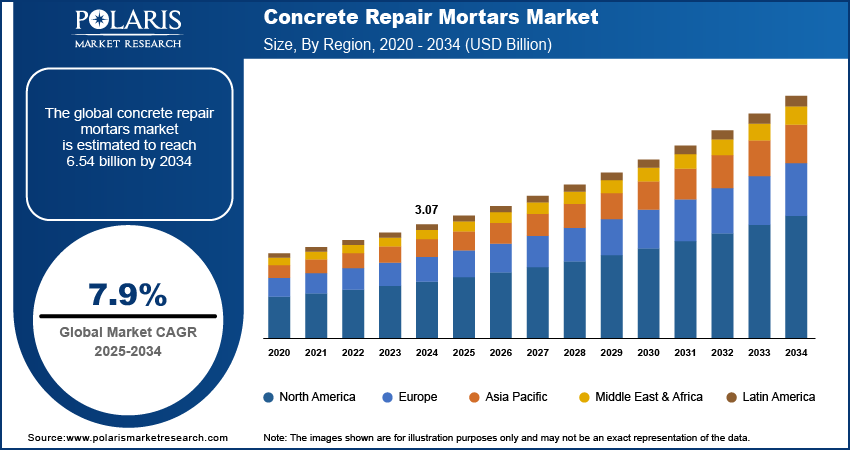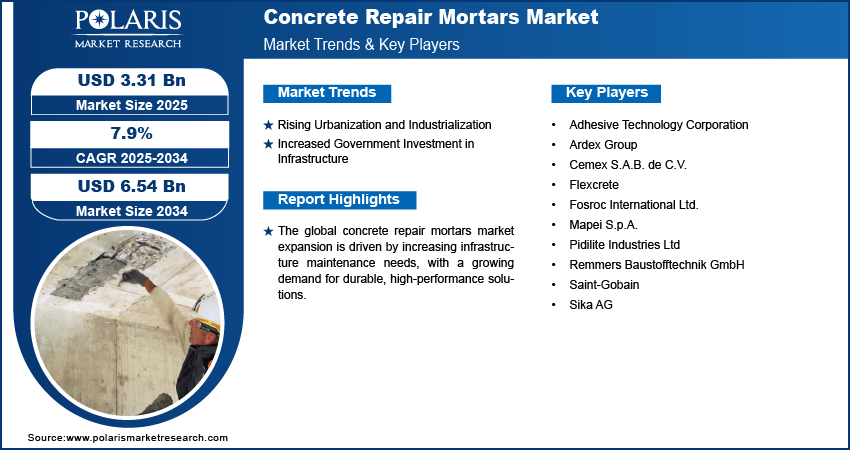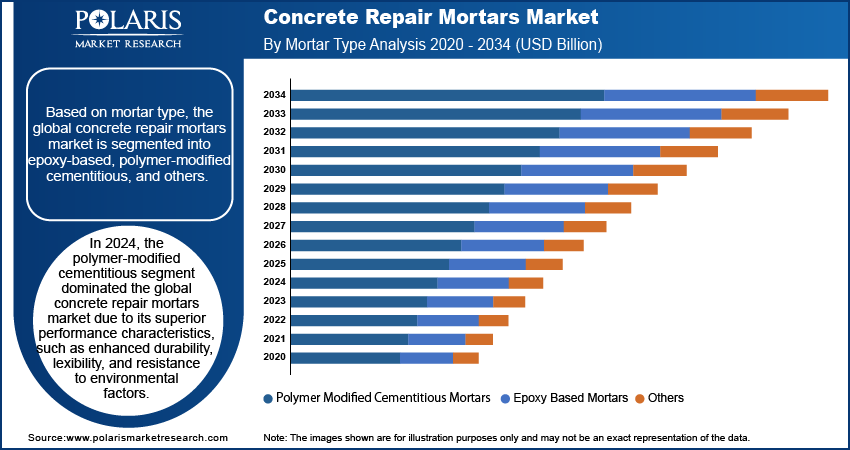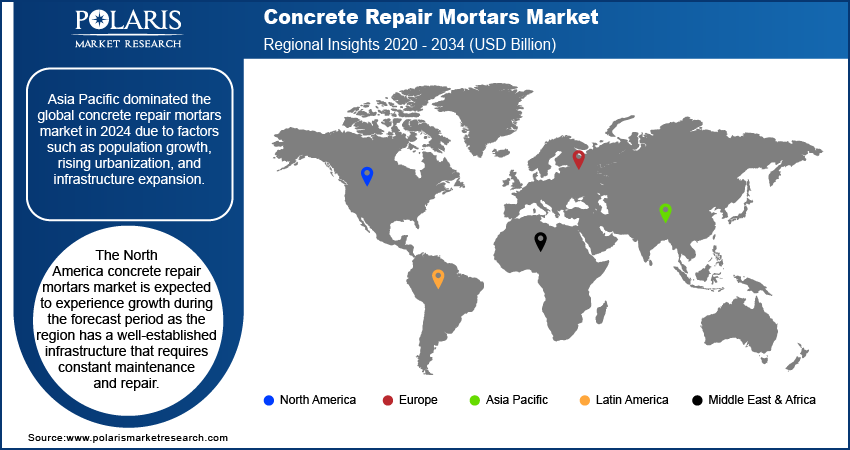
Concrete Repair Mortars Market Share, Size, Trends, Industry Analysis Report: By Mortar Type, Method of Application (Spraying, Manual, Pouring, and Others), End Use, and Region (North America, Europe, Asia Pacific, Latin America, and Middle East & Africa) – Market Forecast, 2025 –2034
- Published Date:Jan-2025
- Pages: 128
- Format: PDF
- Report ID: PM1819
- Base Year: 2024
- Historical Data: 2020-2023
Concrete Repair Mortars Market Overview
The global concrete repair mortars market size was valued at USD 3.07 billion in 2024. The market is projected to grow from USD 3.31 billion in 2025 to USD 6.54 billion by 2034, exhibiting a CAGR of 7.9% during the forecast period.
Concrete repair mortars are specialized materials formulated to restore damaged concrete surfaces, providing adhesion, strength, and durability. They effectively fill cracks and imperfections, enhancing structural integrity and longevity.
The concrete repair mortars market demand is fueled by increasing investments in infrastructure development across the world. Rising demand for residential and commercial buildings is increasing spending on construction projects. For instance, the US Census Bureau reported that in September 2024, the US allocated ∼USD 2,148.8 billion to commercial construction. This surge in infrastructural projects necessitates effective concrete repair mortar solutions. Additionally, concrete repair mortars play a critical role in maintaining and strengthening concrete structures, supporting modernization and expansion efforts, thereby driving consistent market demand.

To Understand More About this Research: Request a Free Sample Report
Growing environmental concerns are driving market growth as there is an increasing emphasis on the need for sustainable construction practices. Regulatory pressures and heightened awareness of ecological impacts are prompting a demand for eco-friendly solutions, such as low-emission products and waste-reducing technologies. The market for sustainable construction equipment and technologies continues to expand as stakeholders aim to align with environmental standards and reduce carbon footprints.
Major companies such as Pidilite Industries Ltd, Saint-Gobain, and others are prioritizing the development of carbon-neutral products aimed at significantly reducing carbon emissions. These organizations are ensuring their offerings align with sustainability goals by incorporating energy-efficient production processes and investing in carbon offset initiatives. These measures contribute to creating a greener future while promoting environmentally responsible innovation. In November 2023, MAPEI launched a carbon-neutral product line aimed at reducing environmental impact through efficient in-house measures and certified carbon credits. This new range, alongside their CUBE System and Re-Con line, supports renewable energy and reforestation, reinforcing MAPEI's commitment to sustainability.
Concrete Repair Mortars Market Drivers Analysis
Rising Urbanization and Industrialization
Urbanization and industrialization propel a greater need for durable repair solutions to maintain and repair existing structures as cities grow and industrial facilities expand. This trend reflects the essential role of repair mortars in sustaining infrastructure amidst rapid urban development and industrial progress. Additionally, market leaders are innovating new concrete repair mortars to meet growing demand. For instance, in August 2024, Sika expanded its production capacity at the Bekasi plant in Indonesia, its largest manufacturing site, to meet the growing demand for construction materials such as tile adhesives and grouts. This expansion aims to support infrastructure, residential, and commercial projects in the country, the fourth most populous in the world, by enhancing distribution capabilities. These advancements focus on durability and efficiency, with companies developing advanced formulations and technologies. This proactive approach highlights the vital role of repair mortars in supporting the ongoing expansion and maintenance of urban and industrial infrastructure. Therefore, rising urbanization and industrialization boost the concrete repair mortars market development.
Increased Government Investments in Infrastructure
Governments around the world are investing heavily in infrastructure development, particularly in improving and maintaining roadways. Additionally, through partnerships with private organizations, governments are accelerating their infrastructure initiatives, leading to increased demand for specialized concrete repair solutions. This collaborative model is crucial for advancing the development and maintenance of essential road infrastructure. For instance, according to a February 2023 report by Invest India, India is making substantial investments in infrastructure to achieve its goal of becoming a developed nation by 2047. In 2024, the government allocated 3.3% of the GDP to infrastructure, with a focus on transportation, logistics, and urban development. Key initiatives include the expansion of highways, airports, and ports, with significant private sector involvement through public–private partnerships (PPP). This initiative is driving the need for advanced concrete repair mortars to ensure the durability and enhancement of infrastructure, thereby stimulating the concrete repair mortars market growth and innovation in repair technologies.

Concrete Repair Mortars Market Segmental Analysis
Concrete Repair Mortars Market Assessment by Mortar Type Outlook
The global concrete repair mortars market, based on mortar type, is segmented into epoxy-based, polymer-modified cementitious, and others.
In 2024, the polymer-modified cementitious segment dominated the global concrete repair mortars market share due to its superior performance characteristics, such as enhanced durability, flexibility, and resistance to environmental factors. These mortars are ideal for repairing a wide range of structures, offering improved bonding to substrates and better crack resistance compared to traditional cementitious mortars. For instance, in March 2020, W. R. Meadows, Inc. launched MEADOW-PATCH SMOOTH-GRADE, a one-component, polymer-modified, cement-based finisher. Designed to fill cracks and smooth rough surfaces, it boasts superior adhesion, durability, and a 45-minute pot life. Additionally, their relatively easy application and cost-effectiveness make them a preferred choice for both residential and commercial repair projects. The growing focus on infrastructure rehabilitation, particularly in regions such as North America and Europe, further fueled the demand for polymer-modified cementitious solutions in 2024.
Concrete Repair Mortars Market Evaluation by End Use Analysis
The global concrete repair mortars market segmentation, based on end use, includes utility, roads and infrastructure, buildings, and others. The demand from the roads and infrastructure segment is expected to increase during the forecast period due to the growing public infrastructure development, especially in emerging economies. A report by the India Brand Equity Foundation (IBEF) published in October 2024 highlighted several large-scale government investments in public infrastructure that have been announced in recent years. In March 2024, India inaugurated multiple connectivity projects in Kolkata, totaling US$ 1.8 billion. Additionally, the Minister of Civil Aviation and Steel revealed plans to inaugurate 15 airport projects worth US$ 12.1 billion by 2028. Moreover, in June 2022, the Minister of Road Transport and Highways launched 15 national highway projects worth US$ 1.7 billion in Patna and Hajipur, Bihar, further boosting infrastructure development in India. These initiatives highlight the government's focus on improving infrastructure as part of its long-term development strategy.

Concrete Repair Mortars Market Regional Outlook
By region, the study provides the concrete repair mortars market insights into North America, Europe, Asia Pacific, Latin America, and the Middle East & Africa.
Asia Pacific dominated the global concrete repair mortars market revenue share in 2024 due to factors such as population growth, urbanization, and infrastructure expansion. The increased use of concrete repair mortars in the region is attributed to high construction activities, technological advancements, and rising disposable incomes. Additionally, substantial government investments in infrastructure development and maintenance have further fueled market growth in this region. The India concrete repair mortars market is expected to grow in 2032 due to the rising population. According to a report by the UN Department of Economic and Social Affairs Economic Analysis published in April 2023, India's population in 2024 is estimated at 1.43 billion, up from 1.42 billion in 2022. This ongoing growth is expected to continue, with projections indicating the population could reach ∼1.67 billion by 2050, representing an 18% increase. There will be a heightened demand for improved infrastructure to support urbanization and economic development as the population expands. This growth necessitates extensive construction and maintenance of roads, bridges, and buildings. Consequently, the demand for concrete repair mortars will rise, as these materials are essential for the growth and enhancement of existing structures to accommodate the needs of a growing population.

The North America concrete repair mortars market is expected to experience growth during the forecast period as the region has a well-established infrastructure that requires constant maintenance and repair, particularly with aging bridges, highways, and buildings. Increasing government spending on infrastructure projects and the growing emphasis on road safety and durability have propelled the demand for high-quality repair solutions. Additionally, the trend toward more sustainable construction practices, with a preference for durable and environmentally friendly materials such as polymer-modified cementitious mortars, is driving concrete repair mortars market expansion in the region.
Concrete Repair Mortars Market – Key Players and Competitive Analysis Report
The competitive landscape of the concrete repair mortars market is characterized by a mix of global leaders and regional players aiming for market share through technological innovation, strategic alliances, and regional expansion. Key global companies such as Sika, BASF, and LafargeHolcim leverage extensive research and development (R&D) capabilities, advanced manufacturing processes, and vast distribution networks to provide high-performance concrete repair solutions. Concrete repair mortars market trends indicate a growing demand for durable, eco-friendly, and sustainable repair mortars, driven by increasing infrastructural developments, particularly in the residential, commercial, and industrial sectors. The market is also witnessing a rise in innovations such as high-strength mortars, rapid-setting products, and mortars designed for specific applications, such as underwater repairs or those resistant to extreme weather conditions. According to market reports, the concrete repair mortars market is expected to grow significantly, fueled by the need for infrastructure restoration, particularly in aging infrastructure and construction projects worldwide. Regional players are capitalizing on localized needs by offering cost-effective solutions, particularly in emerging markets such as Asia Pacific, which is expected to grow at the fastest rate. Competitive strategies include mergers and acquisitions, joint ventures, and partnerships with construction firms and government bodies to address the increasing demand for efficient and long-lasting concrete repair products. These efforts underscore the importance of technological innovation, market adaptation, market growth, and regional investments in expanding the concrete repair mortars industry. A few major players in the concrete repair mortars market are Adhesive Technology Corporation, Ardex Group, Cemex S.A.B. de C.V., Flexcrete, Fosroc International Ltd., Mapei S.p.A., Pidilite Industries Ltd, Remmers Baustofftechnik GmbH, Saint-Gobain, and Sika AG.
Pidilite Industries Limited is a supplier specializing in concrete repair mortars and related construction solutions. The company offers a wide range of products tailored for concrete repair, including high-performance repair mortars designed to restore and enhance the durability of concrete structures. Pidilite's concrete repair solutions cater to various applications, ensuring effective repairs and maintenance of aging infrastructure and industrial assets. Committed to innovation and quality, the company focuses on advancing its product offerings to meet the growing demands of the construction industry, particularly in the area of concrete restoration and maintenance. In August 2024, Pidilite Industries revealed plans to invest significantly in expanding its manufacturing facilities in India. The new plant will specialize in advanced adhesives and sealants to address growing domestic and international demand.
Sika AG is a specialty chemical for the construction and industrial sectors. The company operates across various segments such as bonding, sealing, damping, reinforcing, and protecting. Sika's extensive portfolio includes solutions for concrete repair, adhesives, and sealants. Known for its innovation and sustainability, the company supports transformation in the construction and transportation industries. The company's commitment to environmental compatibility and quality is integral to its operations and growth strategy. In August 2024, Sika AG acquired Vinal Dom, S.A.S, a construction chemicals company in the Dominican Republic. This acquisition enhances Sika's market presence in the Caribbean, adding a new manufacturing facility and broadening its product offerings.
List of Key Companies in Concrete Repair Mortars Market
- Adhesive Technology Corporation
- Ardex Group
- Cemex S.A.B. de C.V.
- Flexcrete
- Fosroc International Ltd.
- Mapei S.p.A.
- Pidilite Industries Ltd
- Remmers Baustofftechnik GmbH
- Saint-Gobain
- Sika AG
Concrete Repair Mortars Industry Development
In May 2023, Sika AG acquired MBCC Group to expand its global presence and enhance its range of products and services, covering all aspects of the construction lifecycle. This acquisition was intended to strengthen Sika's position in the global market.
In June 2023, Fosroc appointed Mannai Trading Co. WLL as its exclusive distributor in Qatar. The partnership aims to provide high-performance construction chemicals to the growing market, with a focus on environmentally friendly practices.
In June 2024, Saint-Gobain expanded its presence in the construction chemicals market by acquiring Fosroc, a leading company in construction chemicals across Asia and emerging markets.
In July 2024, Cemex partnered with the Ellen MacArthur Foundation to promote circular economy practices in the construction industry. This collaboration aims to incorporate circular principles into Cemex’s cement supply chain, promoting sustainability and reducing waste through its Regenera business. The goal is to lead the industry toward more sustainable practices.
Concrete Repair Mortars Market Segmentation
By Mortar Type Outlook (Revenue – USD Billion, 2020–2034)
- Epoxy Based Mortars
- Polymer Modified Cementitious Mortars
- Others
By Method of Application Outlook (Revenue – USD Billion, 2020–2034)
- Spraying
- Manual
- Pouring
- Others
By End Use Outlook (Revenue – USD Billion, 2020–2034)
- Utility
- Roads and Infrastructure
- Buildings
- Others
By Regional Outlook (Revenue – USD Billion, 2020–2034)
- North America
- US
- Canada
- Europe
- Germany
- France
- UK
- Italy
- Spain
- Netherlands
- Russia
- Rest of Europe
- Asia Pacific
- China
- Japan
- India
- Malaysia
- South Korea
- Indonesia
- Australia
- Rest of Asia Pacific
- Middle East & Africa
- Saudi Arabia
- UAE
- Israel
- South Africa
- Rest of Middle East & Africa
- Latin America
- Mexico
- Brazil
- Argentina
- Rest of Latin America
Concrete Repair Mortars Market Report Scope
|
Report Attributes |
Details |
|
Market Size Value in 2024 |
USD 3.07 billion |
|
Market Size Value in 2025 |
USD 3.31 billion |
|
Revenue Forecast by 2034 |
USD 6.54 billion |
|
CAGR |
7.9% from 2025 to 2034 |
|
Base Year |
2024 |
|
Historical Data |
2020–2023 |
|
Forecast Period |
2025–2034 |
|
Quantitative Units |
Revenue in USD Billion and CAGR from 2025 to 2034 |
|
Report Coverage |
Revenue Forecast, Market Competitive Landscape, Growth Factors, and Trends |
|
Segments Covered |
|
|
Regional Scope |
|
|
Competitive Landscape |
|
|
Report Format |
|
|
Customization |
Report customization as per your requirements with respect to countries, regions, and segmentation. |
FAQ's
The global concrete repair mortars market size was valued at USD 3.07 billion in 2024 and is projected to grow to USD 6.54 billion by 2034.
The global market is projected to register a CAGR of 7.9% during the forecast period.
Asia Pacific dominated the global market in 2024.
A few key players in the market are Adhesive Technology Corporation, Ardex Group, Cemex S.A.B. de C.V., Flexcrete, Fosroc International Ltd., Mapei S.p.A., Pidilite Industries Ltd, Remmers Baustofftechnik GmbH, Saint-Gobain, and Sika AG.
The polymer-modified cementitious segment dominated the market in 2024.
The roads and infrastructure segment is expected to grow at the highest rate in the global market during the forecast period
